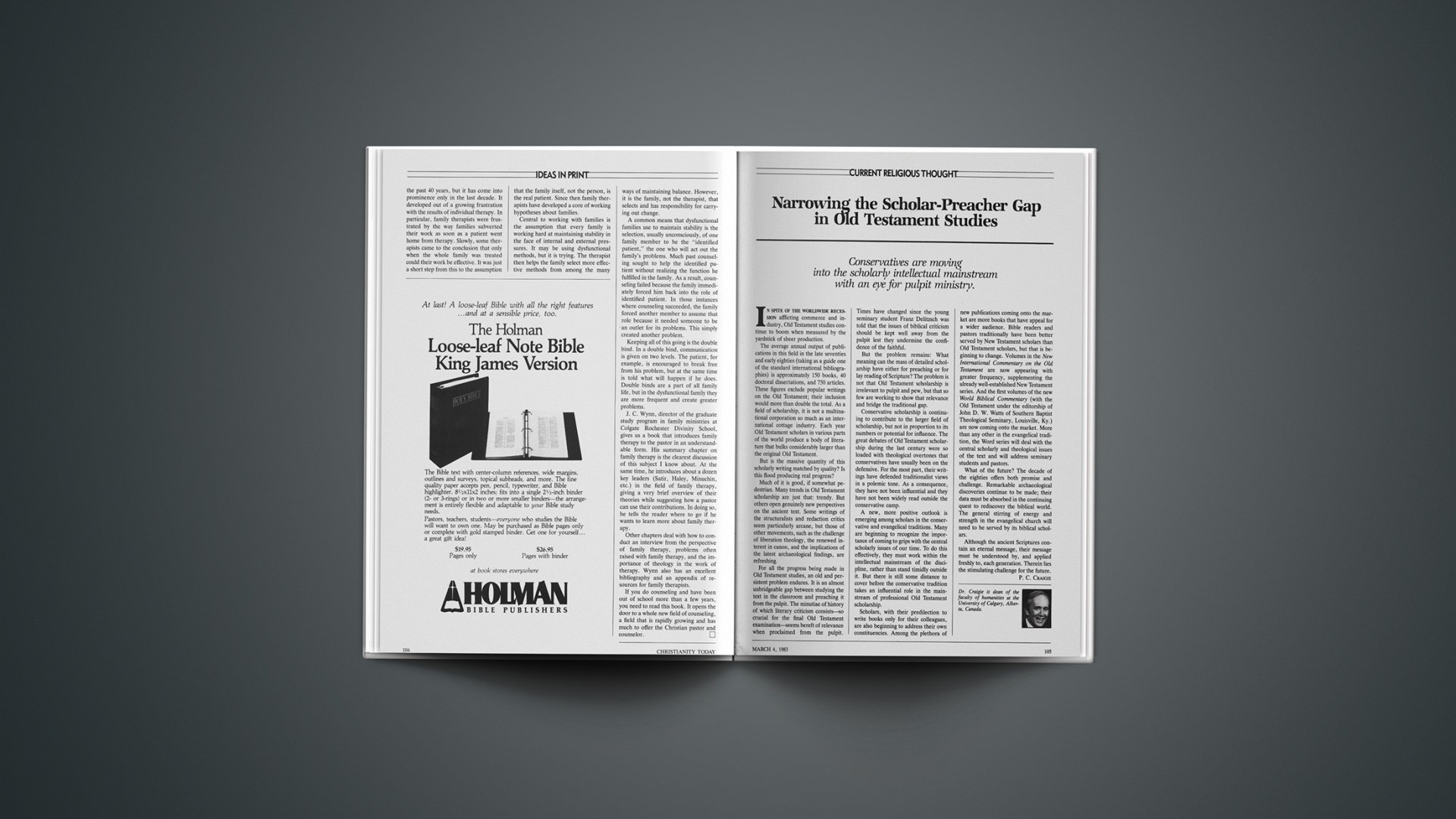Conservatives are moving into the scholarly intellectual mainstream with an eye for pulpit ministry.
In spite of the worldwide recession afflicting commerce and industry, Old Testament studies continue to boom when measured by the yardstick of sheer production.
The average annual output of publications in this field in the late seventies and early eighties (taking as a guide one of the standard international bibliographies) is approximately 150 books, 40 doctoral dissertations, and 750 articles. These figures exclude popular writings on the Old Testament; their inclusion would more than double the total. As a field of scholarship, it is not a multinational corporation so much as an international cottage industry. Each year Old Testament scholars in various parts of the world produce a body of literature that bulks considerably larger than the original Old Testament.
But is the massive quantity of this scholarly writing matched by quality? Is this flood producing real progress?
Much of it is good, if somewhat pedestrian. Many trends in Old Testament scholarship are just that: trendy. But others open genuinely new perspectives on the ancient text. Some writings of the structuralists and redaction critics seem particularly arcane, but those of other movements, such as the challenge of liberation theology, the renewed interest in canon, and the implications of the latest archaeological findings, are refreshing.
For all the progress being made in Old Testament studies, an old and persistent problem endures. It is an almost unbridgeable gap between studying the text in the classroom and preaching it from the pulpit. The minutiae of history of which literary criticism consists—so crucial for the final Old Testament examination—seems bereft of relevance when proclaimed from the pulpit. Times have changed since the young seminary student Franz Delitzsch was told that the issues of biblical criticism should be kept well away from the pulpit lest they undermine the confidence of the faithful.
But the problem remains: What meaning can the mass of detailed scholarship have either for preaching or for lay reading of Scripture? The problem is not that Old Testament scholarship is irrelevant to pulpit and pew, but that so few are working to show that relevance and bridge the traditional gap.
Conservative scholarship is continuing to contribute to the larger field of scholarship, but not in proportion to its numbers or potential for influence. The great debates of Old Testament scholarship during the last century were so loaded with theological overtones that conservatives have usually been on the defensive. For the most part, their writings have defended traditionalist views in a polemic tone. As a consequence, they have not been influential and they have not been widely read outside the conservative camp.
A new, more positive outlook is emerging among scholars in the conservative and evangelical traditions. Many are beginning to recognize the importance of coming to grips with the central scholarly issues of our time. To do this effectively, they must work within the intellectual mainstream of the discipline, rather than stand timidly outside it. But there is still some distance to cover before the conservative tradition takes an influential role in the mainstream of professional Old Testament scholarship.
Scholars, with their predilection to write books only for their colleagues, are also beginning to address their own constituencies. Among the plethora of new publications coming onto the market are more books that have appeal for a wider audience. Bible readers and pastors traditionally have been better served by New Testament scholars than Old Testament scholars, but that is beginning to change. Volumes in the New International Commentary on the Old Testament are now appearing with greater frequency, supplementing the already well-established New Testament series. And the first volumes of the new World Biblical Commentary (with the Old Testament under the editorship of John D. W. Watts of Southern Baptist Theological Seminary, Louisville, Ky.) are now coming onto the market. More than any other in the evangelical tradition, the Word series will deal with the central scholarly and theological issues of the text and will address seminary students and pastors.
What of the future? The decade of the eighties offers both promise and challenge. Remarkable archaeological discoveries continue to be made; their data must be absorbed in the continuing quest to rediscover the biblical world. The general stirring of energy and strength in the evangelical church will need to be served by its biblical scholars.
Although the ancient Scriptures contain an eternal message, their message must be understood by, and applied freshly to, each generation. Therein lies the stimulating challenge for the future.
P. C. CRAIGIE1Dr. Craigie is dean of the faculty of humanities at the University of Calgary, Alberta, Canada.










